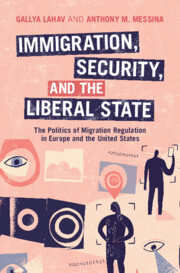 Immigration, Security, and the Liberal State
Immigration, Security, and the Liberal State Book contents
- Immigration, Security, and the Liberal State
- Immigration, Security, and the Liberal State
- Copyright page
- Epigraph
- Contents
- Figures
- Tables
- Preface and Acknowledgements
- 1 Introduction
- 2 Framing and Reframing Immigration
- 3 Expanding the Migration Policy Playing Field
- 4 Popular Attitudes towards Immigration Regulation
- 5 Immigration and the Politics of Threat
- 6 Securitizing and Politicizing Immigration
- 7 Conclusions
- References
- Index
7 - Conclusions
Liberalism Compromised?
Published online by Cambridge University Press: 09 February 2024
- Immigration, Security, and the Liberal State
- Immigration, Security, and the Liberal State
- Copyright page
- Epigraph
- Contents
- Figures
- Tables
- Preface and Acknowledgements
- 1 Introduction
- 2 Framing and Reframing Immigration
- 3 Expanding the Migration Policy Playing Field
- 4 Popular Attitudes towards Immigration Regulation
- 5 Immigration and the Politics of Threat
- 6 Securitizing and Politicizing Immigration
- 7 Conclusions
- References
- Index
Summary
The Conclusions summarize the book’s findings and revisits the question of whether contemporary liberal states can manage immigration and human mobility in a new security environment. Based on the evidence, we conclude that liberal states in the post-Cold War era are empowered to implement restrictive and illiberal policies by enlisting the cooperation of non-central state gatekeepers and the support of their publics. The chapter then considers the implications of the contemporary migration policy playing field for the civil liberties of citizens and migrants. It also surveys the effects of the 2019-22 Covid-19 pandemic on the course of human mobility worldwide and assesses whether they resonate with the assumptions of the book’s immigration threat politics paradigm. Several emergent inter-generational and values patterns around human mobility and immigration are then identified. We conclude with muted optimism about the liberal compromise elicited by the paradigm shift to embedded securitism. Despite its affront to the core values and principles upon which liberal democracies were founded, the expansion of the migration regulatory field reflects the consent of the governed.
Keywords
- Type
- Chapter
- Information
- Immigration, Security, and the Liberal StateThe Politics of Migration Regulation in Europe and the United States, pp. 320 - 356Publisher: Cambridge University PressPrint publication year: 2024
